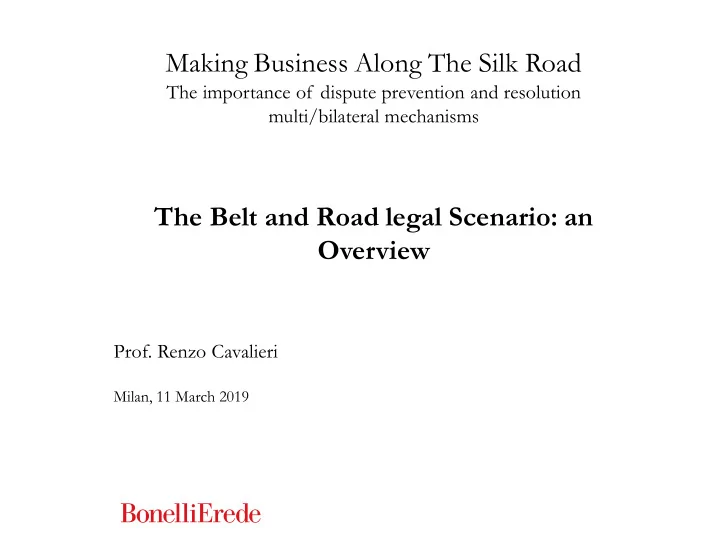

Making Business Along The Silk Road The importance of dispute prevention and resolution multi/bilateral mechanisms The Belt and Road legal Scenario: an Overview Prof. Renzo Cavalieri Milan, 11 March 2019
The Belt and Road Initiative and the Law The BRI as “brand” on three-layers : 1. Infrastructure/transports/energy 2. Economic/business cooperation (trade and investments) 3. “Globalization 2.0”, borderless: BRI as the symbol of China’s global repositioning At all levels, the BRI has a direct impact on a number of legal issues. It affects the international community, states, public entities, private companies, legislators and judges, multilateral and bilateral agreements, national laws (e.g. public procurement, crossborder M&A), legal practice and dispute resolution. As the symbol of China’s growing role in the global arena, BRI means: 1. China’s full integration in the old Bretton Woods system, and in general in Western-led post WW2 legal institutions 2. The creation of a new legal order, multipolar but with a (co)leading role for China 2
Reshaping International Institutions • China’s international socialization moves forward fast and the PRC earns the relevant know how (technical, linguistic, relational…) and gets the more and more integrated in the global system. In doing so, it somehow reshapes the whole institutional system. Two examples: • Multilateral: the WTO (2001) - In 2007 first formal independent claim, slow adaptation to the rules and practices of a multilateral organization. Use of legal tools: from lawmaking to dispute resolution. China’s “normalization” • Bilateral: BITs evolution reflect the changing role of China in global economy: from being a recepient of foreign investments to a big investor overseas. China- Tanzania BIT (2013) seen as the first of the «new generation BITs» strongly influenced by Chinese interests. ICSID: the Ping An case (2012) • China has learnt the Western- led system’s style and rules and makes use of its tools, but is not satisfied with it: its ideological infrastructure is old and not fully accepted and its governance is still too strictly kept in the hands of the US/UK/EU 3
Creating a New System The BRI operates simultaneously and coherently on all sectors and fields of political and economic relations with flexible and often informal tools (very traditional, as opposed to the mechanic/legalistic Western model): 1. New specific international agreements - either very broad (MOUs, as the one that Italy might sign soon) or very specific – with individual states and regional organizations (SCO, FOCAC, BRICS…). Some FTAs are included in the picture, mainly with neighbors; 2. New financial institutions. The Asian Infrastructure Investment Bank (PRC 30,8%, Italy 2,6%) is the clearest example of the strategy. Silk Road Fund (Pirelli) and other public actors playing a market role and accompanying the BRI 3. New judicial institutions. The International Commercial Courts: two courts in Xi’an and Shenzhen, 8 judges, an international expert committee. Language, flexibility, integration with arbitration and mediation (close relation with CIETAC). Some doubts on the adaptation to China’s procedural rules and on the competition of main arbitration institutions. 4
Impact of the BRI on Legal Practice Contractual practice: Chinese companies pay more attention to technical legal tools in their operations and become familiar with international contractual practice. Their business style is reflected in contract negotiation and drafting (from conditionalities to dispute resolution clauses). A strong bargaining power. But English still the common language. Law firms: growing Chinese influence on the global legal profession (and education), particularly in business law. Chinese firms are getting international and contribute to a new style of work, where technological innovation plays a great role. Chinese firms going global: the example of Milan. National compliance : China’s go global policy generates issues in compliance with local legislations (competition, public procurement, money laundering, post- merger integration…) and Chinese companies often face such issues (e.g. 2017 Beograd-Budapest railway). However things are quickly changing: the fazhi principle will apply also to cross-border relations. Dispute resolution: State/state, States/companies, companies/companies. Courts, arbitration, mediation: all tools are affected. China has its own legal tradition: different ideological and organizational assumptions from those of the West. The idea of a plurality of independent (sometimes conflicting) powers is refused, but China supports free trade and open economic interactions, rule-bound dispute resolution and the overall idea of a win-win global coexistence.
Recommend
More recommend